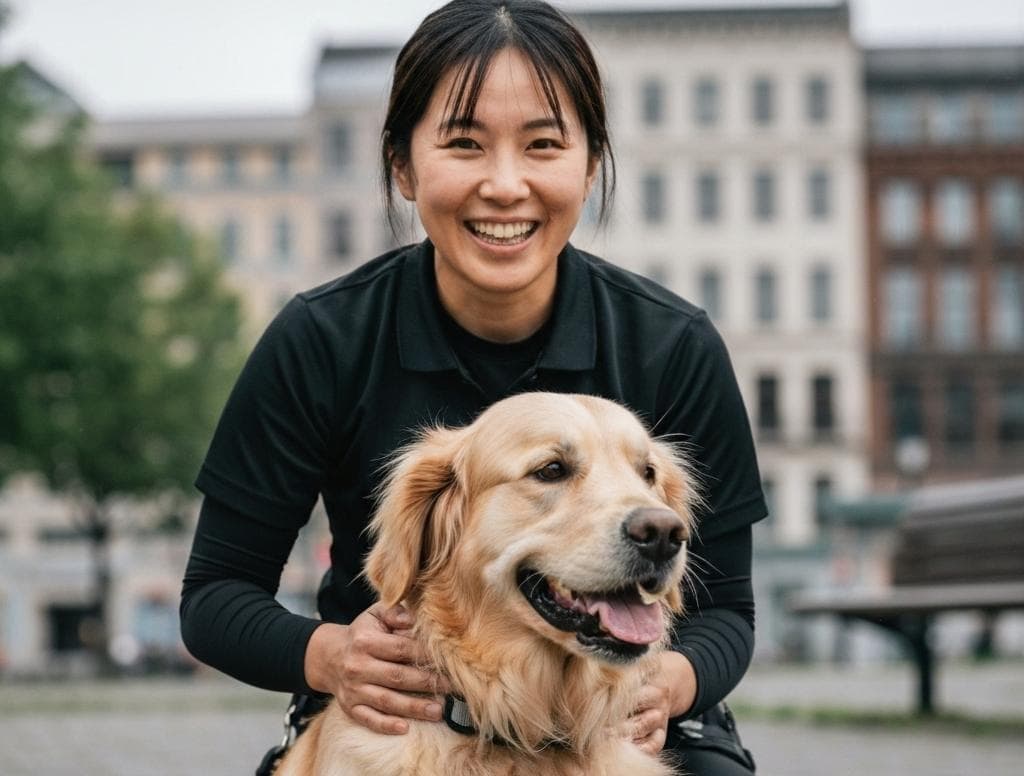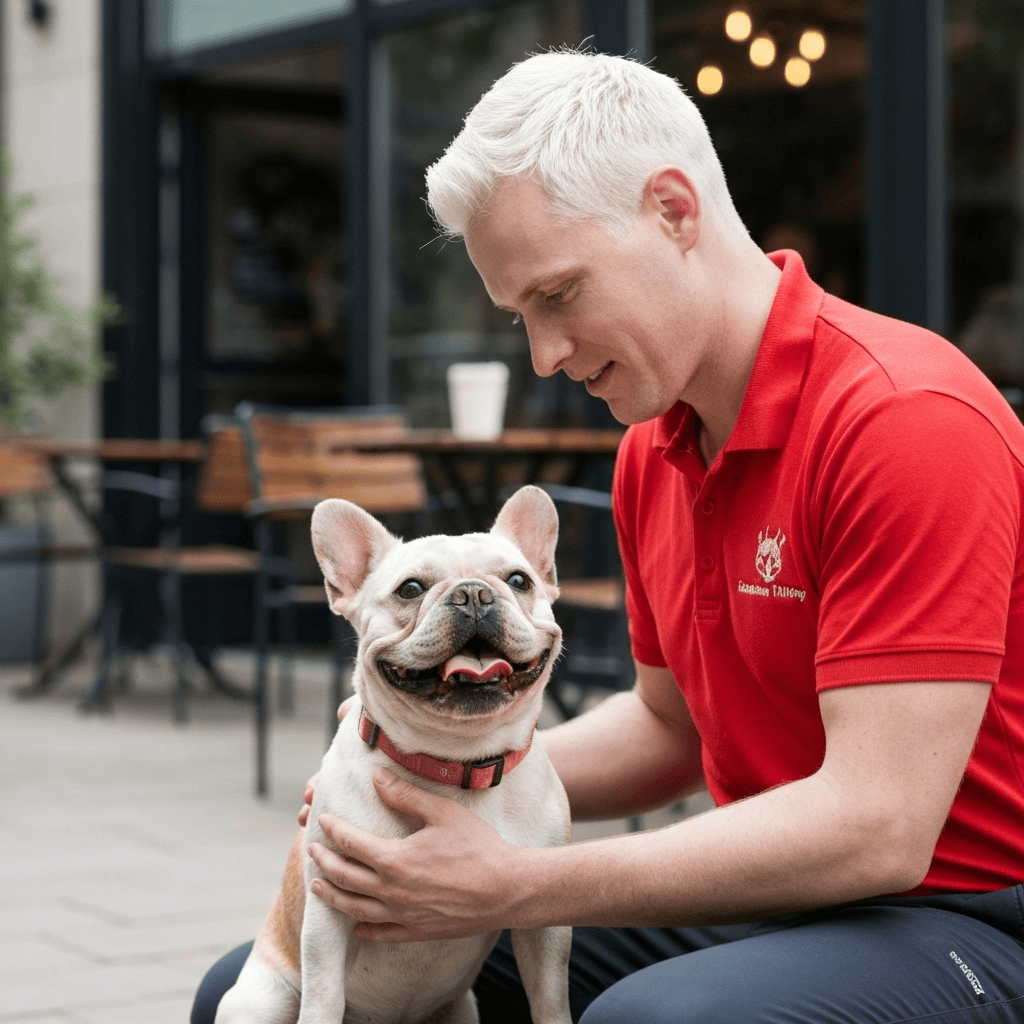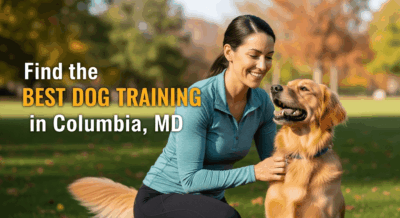Your Complete Guide to Choosing a Dog Trainer in Columbia
When you live with a dog in Columbia, everyday life looks a little different than other places. Your morning walks might take you past the bustling Mall in Ellicott City or through the peaceful pathways around Lake Kittamaqundi. Maybe you grab coffee at Merriweather District while your dog waits patiently, or you need them to stay calm when kids zoom by on bikes near the playground areas.
The thing is, Columbia’s unique layout – with its village centers, interconnected paths, and mix of quiet residential areas and busy community spaces – means your dog needs specific skills to thrive here. A good trainer understands this and can help your dog learn to navigate everything from the crowds at Lakefront events to the distractions along the walking trails that connect Harper’s Choice to Town Center.
How to Choose the Right Trainer
Start with training methods that make sense for your dog. The best trainers use positive reinforcement approaches that teach your dog what you want them to do, rather than just punishing what you don’t want. This is especially important in a place like Columbia, where your dog will encounter so many different situations – from other dogs on the pathways to children playing in village green spaces.
Look for trainers with solid credentials. KPA-CTP, CPDT-KA, and IAABC-CDBC are all respected certifications that show a trainer has invested in professional education. If you want to understand what different credentials mean, there’s a helpful guide to dog trainer certifications that breaks down the most common ones.
But credentials are just the starting point. The right trainer for Columbia life will understand the specific challenges you face here – like teaching your dog to stay focused when there’s a festival happening at Merriweather or helping them learn proper leash manners for the narrow sections of pathway near Wilde Lake.
Some trainers offer in-home dog training, which can be perfect for addressing issues like door manners when delivery drivers come to your townhome or helping your dog learn to settle when neighbors are out in their yards. Group classes work well for dogs who need to practice being around other dogs in controlled settings. And if you’re short on time, private lessons or day training can help you make faster progress.
Common Dog Training Methods Explained

The foundation of good Columbia dog training is practical, everyday skills. Basic obedience covers the essentials – loose-leash walking for those long pathway strolls, polite greetings for when neighbors stop to chat, and reliable recall for emergencies. These aren’t just tricks; they’re the skills that make daily life smoother and safer.
Puppy training and socialization become especially important here because Columbia puppies encounter so much variety early on. A good puppy program will cover house training, crate training, and bite inhibition, but it should also help your puppy learn to stay calm around bicycles, strollers, and the general bustle of community life.
Behavior modification comes into play when dogs struggle with reactivity, fear, or aggression. This might look like a dog who barks at other dogs on the pathways or becomes anxious in crowded spaces like the farmers market. Good behavior modification uses techniques like desensitization and counterconditioning to help dogs feel more confident over time.
Separation anxiety is common in our area, especially with so many people working from home part-time. The right approach involves gradual training to help dogs feel comfortable alone, never punishment-based methods that can make anxiety worse.
Some trainers also offer specialty training like therapy dog preparation or service dog training, though it’s important to have realistic expectations about what’s possible for your individual dog and situation.
Red flags to watch for include trainers who promise quick fixes or rely heavily on punishment tools like shock collars. These approaches often create new problems and can be particularly problematic in a community setting where your dog needs to feel confident and calm around people.
Average Cost of Dog Training in Columbia MD (Updated for 2025)
Training costs in Columbia and Howard County generally reflect the area’s mix of suburban convenience and proximity to major metropolitan areas. Here’s what you can expect to pay:
| Service Type | Average Cost (Columbia/Howard County) |
|---|---|
| Group classes, 4 to 6 weeks | $180 – $350 total |
| Private lessons, 60-75 minutes | $120 – $200 per session |
| Puppy classes, 4 to 6 weeks | $180 – $325 total |
| Day training, 3-5 sessions per week | $700 – $1,200 per week |
| Board and train, 2 to 4 weeks | $2,200 – $4,800 total |
| Behavior consult, initial 75-90 minutes | $150 – $300 |
Prices typically go up for complex behavior cases and trainers with advanced certifications like CBCC-KA or CTC. Always ask what’s included in the price – some trainers include follow-up support or written training plans, while others charge extra for these services.
Questions to Ask a Potential Dog Trainer
When you’re interviewing trainers, these questions will help you find someone who’s a good fit for Columbia life:
- What training methods do you use, and how do you keep sessions positive for my dog?
- What certifications or education do you have, such as CPDT-KA or KPA-CTP?
- Will you provide a written training plan that I can follow at home?
- Do you offer in-home sessions, group classes, or day training options?
- How do you handle dogs who are reactive or fearful in public spaces?
- What exactly is included in your pricing, and are there additional fees I should know about?
- Do you carry liability insurance, and can you show me proof?
- If my dog has behavior issues, do you work with veterinarians when needed?
- How will we know when my dog is ready to practice in busier Columbia locations like the village centers?
Local Columbia Resources for Dog Owners
Columbia and Howard County offer some great resources for dog owners. Worthington Off-Leash Dog Park in Ellicott City gives your dog a chance to run freely and socialize safely. You’ll need an annual permit, and you can find current details on the county’s website: Howard County Dog Parks.
The pathways around Lake Kittamaqundi and through Town Center are perfect for leashed training sessions with real-world distractions. Just remember to follow leash laws and clean up after your dog – you can find specific rules on the Howard County Animal Services website.
For longer adventures, Patapsco Valley State Park offers miles of pet-friendly trails just outside Columbia. Dogs must stay leashed as posted, and you can review the statewide pet policies at Maryland DNR Pet Policy.
Don’t forget about practical requirements like pet licensing, which Howard County requires for all dogs and cats. You can find forms, fees, and current requirements at Howard County Pet Licensing.
Local Laws, Permits, and Practical Notes
Howard County’s leash laws are straightforward – dogs need to be under control and leashed in public unless you’re inside a designated off-leash area. This makes solid leash training essential for enjoying Columbia’s village centers, shared pathways, and community events.
Keep your dog’s license and rabies vaccination current. Howard County requires both, and you should carry proof when asked. The county runs regular low-cost vaccination clinics, which you can find listed at Howard County Rabies Clinics.
Maryland doesn’t require special licensing for dog trainers, which means it’s up to you to check credentials and experience. Responsible trainers carry liability insurance and will get proper permits if they’re using county parks for group classes.

Common Questions About Dog Training in Columbia
How much does in-home dog training cost?
Most Columbia area trainers charge $120 to $200 per private session for in-home work. Package deals often bring down the per-session cost, especially for puppy training or multi-week obedience programs.
Is in-home dog training worth it?
For many Columbia families, yes. In-home training is particularly valuable for issues that happen at home – like door reactivity when packages get delivered, jumping on visitors, or separation anxiety when you leave for work.
Can you pay someone to house train your dog?
Absolutely. Many trainers offer puppy packages, potty training programs, and day training specifically designed to establish good house habits quickly. You’ll still need to be consistent with the routine between sessions.
What is the 3-3-3 rule for dog training?
This rule sets realistic expectations for new dogs – about 3 days to decompress from big changes, 3 weeks to start learning your household routines, and 3 months to feel truly settled in your home. Good training respects this timeline instead of rushing progress.
How long will it take to reach my training goals?
Basic obedience skills typically take 4 to 8 weeks with daily practice between sessions. Behavior issues like reactivity usually require longer timelines with careful step-by-step plans and regular check-ins with your trainer.
What should I bring to group classes?
Most trainers will give you a specific list, but typically you’ll need a flat collar or harness, a 6-foot leash (not retractable), high-value treats cut into small pieces, water for your dog, and vaccination records if requested.
What’s the leash law in Columbia?
Columbia follows Howard County regulations – dogs must be leashed and under control in all public spaces except designated off-leash dog parks. You can review the complete animal control laws at Animal Control Laws.
Do I need a dog license in Columbia or Howard County?
Yes, Howard County requires licenses for all dogs, along with current rabies vaccination. You can get details and application forms at Howard County Pet Licensing.
What shots does my dog need in Howard County or Maryland?
Maryland requires current rabies vaccination for all dogs. Your vet may recommend additional core vaccines based on your dog’s lifestyle and risk factors. For rabies-specific information, check MDH Rabies Information.
Are dog trainers required to be licensed in Columbia or Howard County or Maryland?
No, there’s no special state or county license requirement for dog trainers. That’s why professional certifications like KPA-CTP, CPDT-KA, or IAABC-CDBC become so important – they show a trainer has invested in education beyond the legal minimum.
Where can I practice off-leash recall?
The safest option is Worthington Off-Leash Dog Park, where you can practice recall in a fenced area with a valid permit. For other locations, keep your dog on a long line in quiet, leash-friendly areas until their recall is completely reliable.
Which dog parks allow training around Columbia?
Worthington Off-Leash Dog Park allows training activities as long as you have a valid permit and don’t interfere with other users. Early morning or weekday visits tend to be less crowded. Check current rules at Howard County Dog Parks.
What beaches or trails allow dogs for training?
While Columbia doesn’t have ocean beaches, nearby Patapsco Valley State Park offers excellent trail options for leashed dogs. Always check current pet policies before visiting: Maryland DNR Pet Policy.
Making the Right Choice for Your Columbia Dog
The best dog trainer for your Columbia life will combine solid professional credentials with an understanding of what makes this community unique. Look for someone who uses positive reinforcement methods, carries liability insurance, and can create a clear plan that works both at home and out in the village centers and pathways where you’ll spend time together.
If you want to research specific credentials, the guide to dog trainer certifications can help you understand what designations like KPA-CTP, CPDT-KA, IAABC-CDBC, CBCC-KA, and CTC actually mean for your dog’s training.
With the right professional guidance and consistent practice, your dog can learn to handle everything Columbia throws at them – from busy lakefront festivals to quiet morning walks through the neighborhoods. And that makes life better for both of you.
